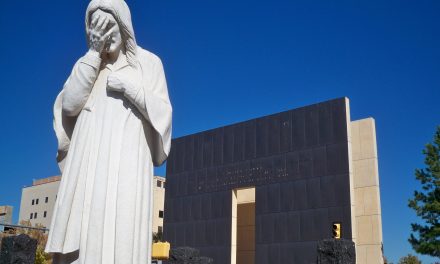Plenty of people ask, “Who is God?” In this season of preparation, we should not forget that Christians have a particular – and particularly weird – answer to that question. We are preparing to unveil it. It is the mystery of cross and resurrection where God is most fully revealed, where we can point and say, “THAT’S who God is.”
It’s a strange sort of answer, and so we need some lead-up to it. I think this Sunday’s readings give us some more conventional answers to the question, “Who is God?” – but then point us in the direction of Easter. The famous burning bush offers gives the philosophically-satisfying news that God is infinite being – but then adds that the abstract source of Being is also the God who is deliverer of Abraham, Isaac, and Jacob. The eternal Creator of the universe is also the one who looks out for Israel, redeems her in distress. It is between these two answers that Christianity has always tried to walk, and it is not an easy path. Philosophical wisdom of all ages seeks an unknown, eternal “force” as God, whereas frail humans have for so often called on God (or gods) as powerful patrons who can provide rescue in times of trial. When Christians ask “who is God?” the answer is both. Which is not a very satisfying answer.
Today’s Gospel, an irritation to preachers everywhere, is even more troubling. It builds on St. Paul’s message today, a tone of urgent warning for all. Jesus is ominously threatening in this reading, promising that, without repentance, people will die shameful deaths and be cut down like a useless, unproductive tree. To whom is the warning addressed? Again, like Paul in the second reading, Jesus here is addressing the complacent.
How does this relate to who God is? The thing about the “redeemer God” bit, especially when it is tied to a particular people, is that one can come to believe “the Lord is kind and merciful”… no matter what. Now, most people who are complacent about God’s mercy still think there are those grave sinners in the world who in fact are struck down by Pilate or a tower (or perhaps the United States). But the key is that they are not among these people. Only the “worse sinners” deserve that kind of punishment. For the rest of us, maybe a little dab of contrition will do, but nothing too major. And it is to these, the spiritually complacent, that today’s readings are addressed.
But why them? The key is to understand the real work of the deliverer God. Pope Francis like to point out that God is a God of surprises. This is most certainly true. Surprises are sometimes delightful. But sometimes they are disturbing, and in some cases, they are both delightful and disturbing. The God we meet in today’s reading is in fact the God of great mercy, the deliverer, the one whose “surpassing kindness to those who fear him” is celebrated in today’s psalm. But if we are going to point to the cross as the place where this God is truly manifest, we need to recognize simultaneously how much we do not want that kind of a deliverer God, the God that invites relentless repentance, relentless fruit bearing, relentless risk. This is a deliverer God who risks all, not in order that we don’t have to, but in order that we can do so as well. Indeed, that is what it ultimately means to be made in the image of God; what we need (as prefigured in the water of the RCIA readings for the day) is release from our sins so that we might live that out.
Who is God? Well, “I AM who AM,” the great Creator, of course, and God the deliverer, too. But that deliverer God is no Zeus or even Pharaoh. God is our deliverer by accompanying us – by accompanying Moses, the people of Israel, and even the barren fig trees who get at least one more year to see if they can get it – but always insisting that we turn from our attachments and bear fruit for the life of the world. And if we do not? Well, as St. Paul reminds us, we know what happened when there was grumbling in the desert…




